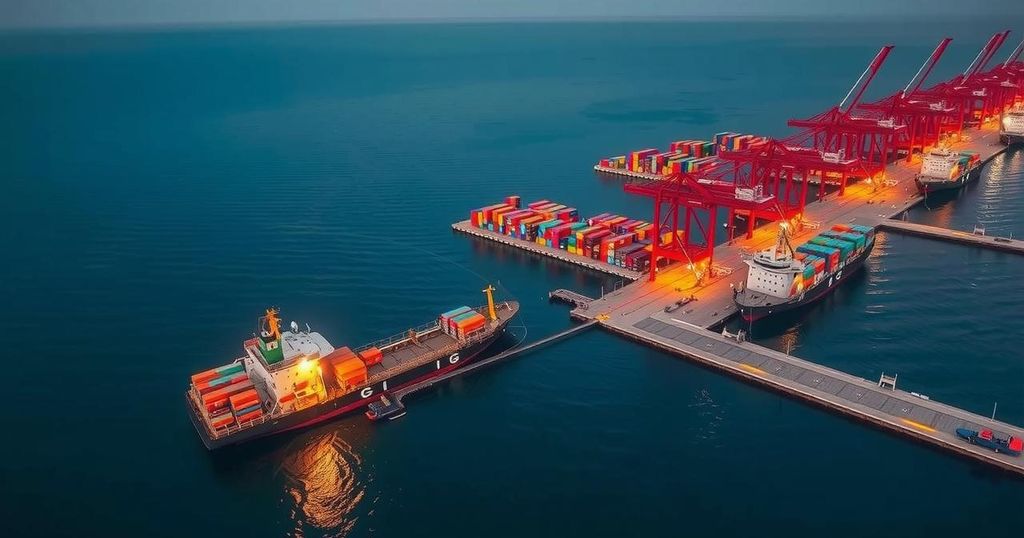Sudan Cancels UAE Port Deal in Response to Alleged Foreign Interference

Sudan has canceled a port deal with the UAE amid accusations of UAE support for the RSF. Finance Minister Jibril Ibrahim declared the deal void to uphold national sovereignty, asserting no territory would be ceded. The cancellation is seen as a political maneuver to reduce UAE influence, reflecting Sudan’s shift in foreign policy against the backdrop of a severe humanitarian crisis affecting millions. The decision has garnered local support, emphasizing the need for investments in domestic development over foreign-controlled projects.
Sudan has officially canceled a port development deal with the United Arab Emirates (UAE) amid rising tensions between the two nations over the UAE’s purported backing of the Rapid Support Forces (RSF). Finance Minister Jibril Ibrahim announced the termination of the memorandum of understanding for establishing the Abu Amama port on the Red Sea coast, asserting that the agreement lacked legal binding on Sudan and was crucial for protecting national sovereignty. At a press conference held in Port Sudan, Mr. Ibrahim emphasized Sudan’s commitment to retaining control over its coastline, declaring that the country would not relinquish “one centimetre” of territory to the UAE. This cancellation coincides with intensified allegations regarding UAE’s involvement aiding the RSF, which has been in conflict with the Sudanese military since April 2023. This move not only indicates a shift in Sudan’s foreign policy but also serves as a potential political strategy to mitigate UAE’s influence amid ongoing regional instability. The historical context of Sudan-UAE relations reveals a complex dynamic, marked by both cooperation and discord. In December 2022, an agreement involving a $6 billion investment for the development of the Abu Amama port was struck with the UAE ports authority. Presently, however, the abrupt cancellation suggests a reevaluation of this partnership, reflecting the shifting political landscape of Sudan. Residents of eastern Sudan, particularly those in Port Sudan, generally view the cancellation favorably, expressing hopes that the government would redirect attention towards local infrastructure development and job creation. There is a community sentiment advocating for investments that serve local interests over foreign-managed endeavours perceived as detrimental to the domestic economy. The Sudanese government is, nevertheless, faced with significant challenges in this decision, as various political factions maintain differing perspectives regarding relations with the UAE and other foreign nations. Balancing these varying opinions is critical for fostering national unity amid complex internal dynamics. Amid a deteriorating humanitarian crisis characterized by surging inflation, currency devaluation, and worsening living conditions, the government’s call for augmented international humanitarian aid has become urgent. The ongoing conflict has tragically resulted in the deaths of at least 18,000 individuals, the displacement of over 11 million, and substantial suffering for the displaced populations facing dire conditions, including food scarcity and violence. The cancellation of this port deal carries implications beyond Sudan’s immediate concerns, influencing its relationships with other regional powers, such as Saudi Arabia and Egypt, which have vested interests in the Red Sea. Sudan now must navigate the precarious geopolitical landscape while striving to maintain its sovereignty and prioritize its citizens’ needs.
The ongoing conflict in Sudan, primarily pitting government forces against the RSF, has escalated since April 2023, resulting in a severe humanitarian crisis throughout the country. The UAE has been accused of providing support to the RSF, thus straining the relationship between Sudan and the UAE. This backdrop is critical to understanding Sudan’s recent cancellation of the port deal, which represents a significant pivot in its foreign policy as it seeks to assert its sovereignty and resist foreign influence amidst regional tensions. The historical agreement for the Abu Amama port development was part of Sudan’s efforts to attract foreign investment but has now come under scrutiny in light of the current political and humanitarian challenges.
In summary, Sudan’s cancellation of the port deal with the UAE marks a crucial juncture in the nation’s foreign relations, reflecting a desire to affirm its sovereignty amidst allegations of foreign interference. The decision resonates positively with many local residents, who advocate for a focus on domestic priorities. However, the Sudanese government must navigate the precarious political landscape while urgently addressing the worsening humanitarian situation faced by its populace. Ultimately, this decision highlights the delicate balance Sudan must maintain with regional powers and underscores its commitment to prioritizing national interests moving forward.
Original Source: www.theeastafrican.co.ke








